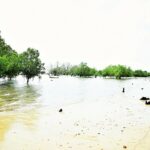
By MESHA Reporter -| info@meshascience.org
Empowering Beach Management Units is key in addressing sustainable management of coastal fisheries by communities, an official has said.
In a statement posted on the website of The Kenya Marine Fisheries and Socio-Economic Development (KEMFSED), Ali Omar Fakii noted that the BMUs are the lifeline of proper management of fisheries along the coast.
He is an official of Bamburi Beach Management Unit in Mombasa and has been a fisher since completing school when he joined his father in buying and selling fish. A couple of years ago, he decided to start fishing because of dwindling profits from reselling fish. Almost daily, he joins a crew of 10-12 men in a boat for fishing trips in the nearshore. On a good day he earns between Ksh800 (USD5) – Ksh1200 (USD8) but sometimes the catch is low, earning him as little as Ksh50 (USD0.3) which is hardly enough for bus fare.
The Kenya Marine Fisheries and Socio-Economic Development (KEMFSED) aims to, among other things improve the management of fisheries and mariculture and increase access to complementary livelihood activities in coastal communities.
Under the component of Coastal Community Empowerment and Livelihoods, KEMSFED works closely with beach management units to help fight illegal fishing and enhancing the value of fish products in the fisheries value chains. They also come in handy to enhance managing and conserving marine and inland water resources.
“When I was young, there were mostly foot fishers but these days the number of boats has increased. The population is big and people coming for leisure are many but the catch has reduced,” he says.
He believes the youth can make a difference if they have knowledge to conserve their biodiversity so that fish stocks increase. He says the youth also need training and equipment to venture into deep-sea fishing.
BMUs are expected to play a key role in development and implementation of plans to jointly manage fishing areas. Co-management ensures fishers can harvest enough fish to make profits while maintaining the capacity of fishing areas to produce sustainable yields in the long term.









